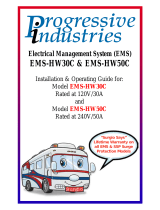
TABLE OF CONTENTS
0740 800 193 © ESAB AB 2018
READ THIS FIRST.................................................................................... 5
INTRODUCTION....................................................................................... 6
Design structure of the power source.................................................. 6
WeldCloud™ ........................................................................................... 7
TECHNICAL DATA ................................................................................... 8
WIRING DIAGRAMS................................................................................. 12
Component description ......................................................................... 12
MMC option for MIG power sources ..................................................... 15
Mig U5000i, 460 V version ..................................................................... 16
Mig 5000i, 460 V version ........................................................................ 18
Mig U5000i WeldCloud™, 460 V version .............................................. 20
Mig 5000i WeldCloud™, 460 V version................................................. 24
INSTALLATION......................................................................................... 28
Configuration of the arc voltage feedback, WeldCloud™ .................. 28
Welding with the filler wire positive or negative, using external voltage
sensing from the wire, without external sensing from the workpiece ...
28
Welding with the filler wire positive or negative, without any external
voltage sensing from the wire or the workpiece ...................................
29
Welding with the filler wire positive, using external voltage sensing
from the wire and the workpiece ..........................................................
30
Welding with the filler wire negative, using external voltage sensing
from the wire and the workpiece ..........................................................
31
DESCRIPTION OF OPERATION.............................................................. 32
AP2 Interference suppressor board ..................................................... 32
1 MMC module ........................................................................................ 32
2AP1 Interference suppressor board ................................................... 33
5 Cooling unit.......................................................................................... 33
15 The power module............................................................................. 34
15AP1 Power board ............................................................................. 35
15AP1:1 Mains rectifier bridge and charging circuit .......................... 35
15AP1:2 Switching circuit.................................................................. 36
15 AP1:3 Overvoltage and undervoltage protection.......................... 37
15 AP1 Connections to the circuit board ........................................... 37
15AP1 Component positions............................................................. 38
15AP2 Gate driver board...................................................................... 38
15AP2:1 Gate driver stages .............................................................. 39
15AP2:2 Overvoltage and undervoltage protection........................... 40
15AP2 Component positions............................................................. 41
15AP4 Filter board with main rectifier .................................................. 42
20AP1 Control board.............................................................................. 42
20AP1:1 Power supply ......................................................................... 43
20AP1:2 Fan control............................................................................. 44






















